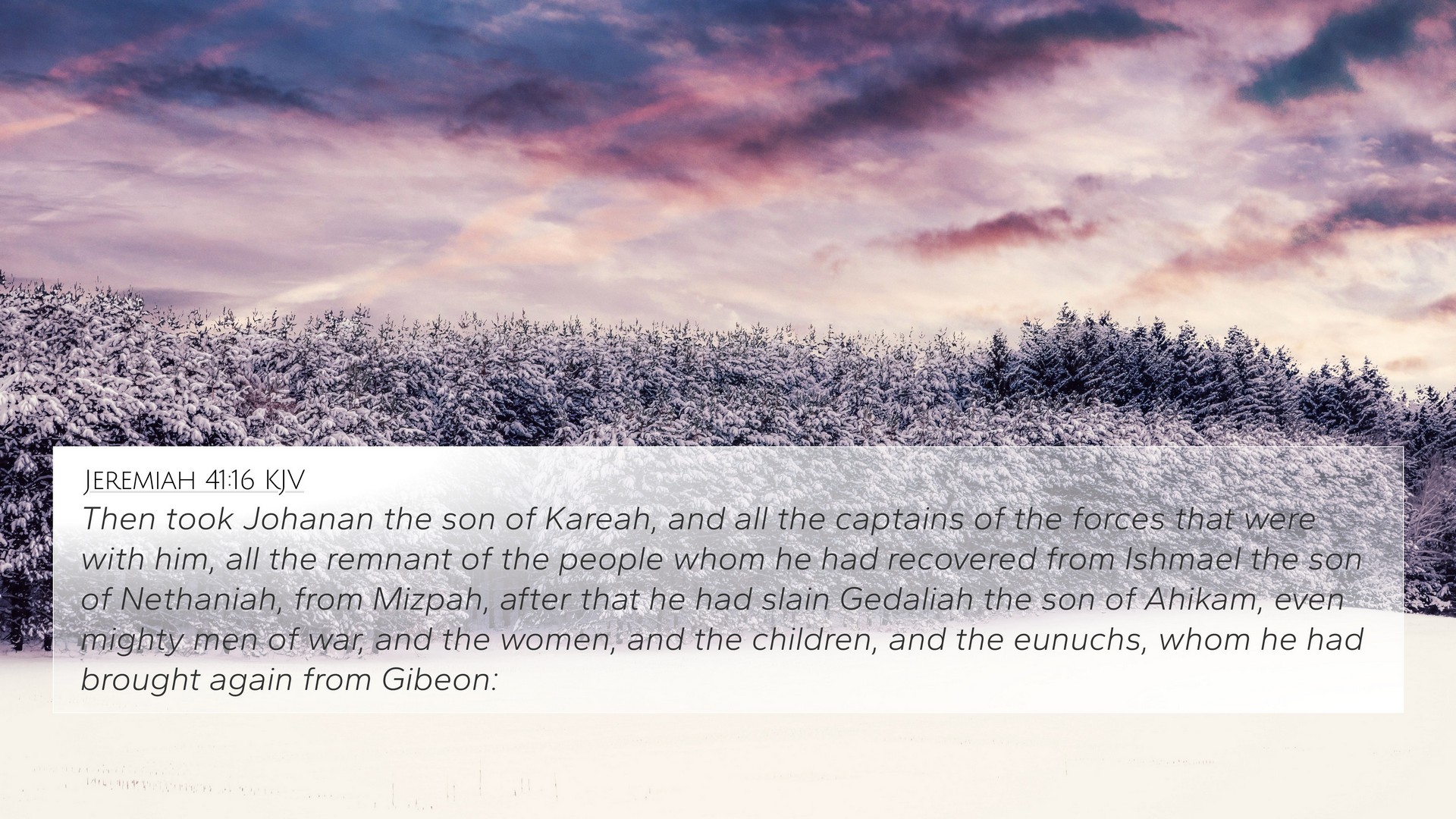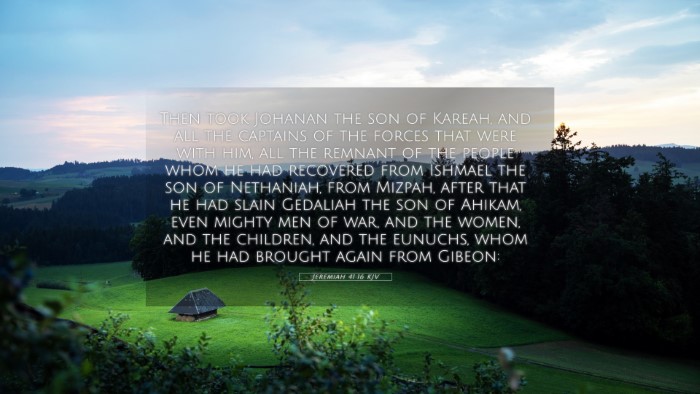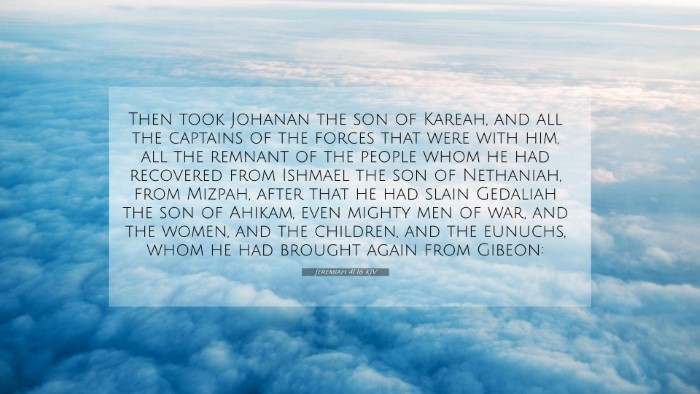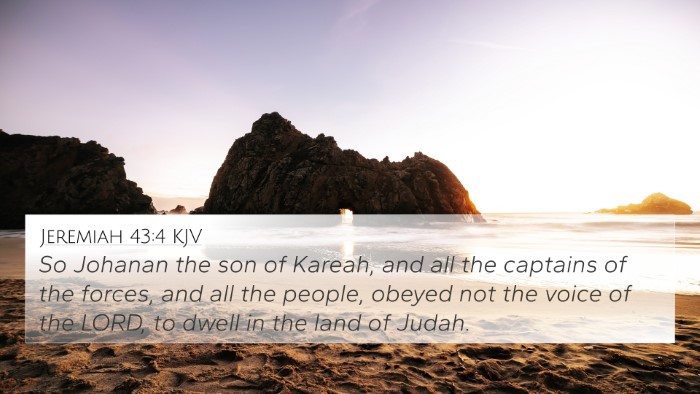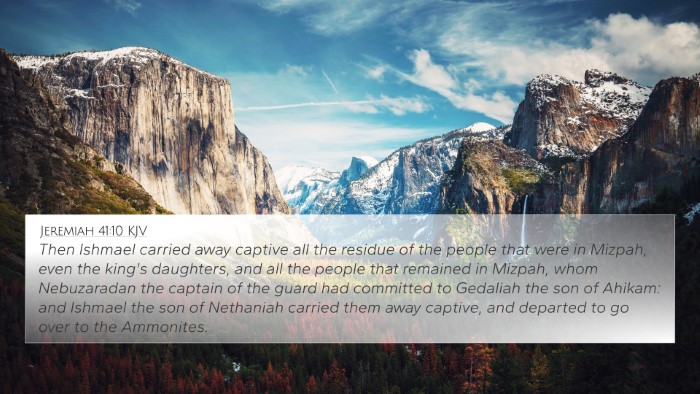Understanding Jeremiah 41:16
Jeremiah 41:16 states, “Then took Johanan the son of Kareah and all the captains of the forces that were with him, and all the remnant of the people whom he had recovered from Ishmael the son of Nethaniah, from Mizpah, after that he had slain Gedaliah the son of Ahikam, even mighty men of war, and the women, and the children, and the eunuchs, whom he had brought again from Gilead.” This passage illustrates a significant moment of rescue and regrouping following a period of tragedy and loss.
Contextual Analysis
This verse occurs in a historical context where the Jewish community, having faced destruction and exile, is beginning to reorganize itself after the death of Gedaliah. Understanding this context is crucial for interpreting the verse's meaning.
Commentary Insights
- Matthew Henry: Henry emphasizes the restoration efforts led by Johanan after a devastating event. The recovery of not only the mighty men but also the women and children signifies hope and continuity for the community. It highlights the importance of leadership during crises.
- Albert Barnes: Barnes points out that Ishmael’s act of slaughter left a vacuum that Johanan sought to fill. This act of recovery symbolizes God's faithfulness even in tumultuous times. The gathering of the remnant reflects a theme of perseverance and survival amidst trial.
- Adam Clarke: Clarke provides a detailed look at the characters involved, noting that Johanan's leadership is a pivotal response to the chaos left in the aftermath of Gedaliah's assassination. The verse underscores themes of loyalty, protection, and the re-establishment of community after betrayal.
Thematic Connections
The situation described in Jeremiah 41:16 carries broader implications regarding community, leadership, and perseverance through difficult times. Several themes emerge that can be explored through cross-references in the Bible:
- Leadership and Protection: Exodus 18:21 discusses the importance of appointing capable leaders to guide others, which parallels Johanan’s role in gathering and protecting the remnant.
- Community Resilience: Isaiah 41:10 reassures believers of God’s support, resonating with the relayed message of hope and recovery found in Jeremiah.
- God’s Faithfulness: The themes in Psalms 27:10, where a father’s abandonment does not equate God's withdrawal, mirror the message of restoration depicted in Jeremiah's verse.
- Recovery from Destruction: Luke 17:3-4 reinforces the necessity of forgiveness and restoration, which can be drawn parallel to the context of Jeremiah’s message.
Cross-References
Here are some additional Bible verses that relate to Jeremiah 41:16, highlighting connections between different texts:
- Jeremiah 40:6 - The previous chapter speaks of the conditions that led to Johanan's actions.
- Jeremiah 43:5-7 - This verse continues to follow the narrative of the captains and the remnants.
- Matthew 2:13-15 - Reflects on the theme of escape and protection, parallel to Johanan's rescue efforts.
- Acts 27:22-24 - Showcases courage and assurance in dire situations, similar to Johanan's stand.
- Matthew 10:29-31 - Illustrating God's oversight in desperate times, akin to the remnant's plight.
- 1 Peter 5:10 - Highlights restoration after suffering, which parallels the rebuilding of community in Jeremiah.
- 2 Corinthians 4:8-10 - Discusses being troubled yet not crushed, reflecting the remnant's resilience.
Conclusion
Jeremiah 41:16 serves as a powerful reminder of the complexities of leadership and community dynamics in the face of adversity. Johanan’s actions provide critical lessons on the significance of gathering and leading the remnant toward hope and renewal. Additionally, by pursuing comparative Bible verse analysis, connecting themes, and understanding scriptural cross-referencing, believers can gain deeper insights into the relational dialogues across the Scriptures.
